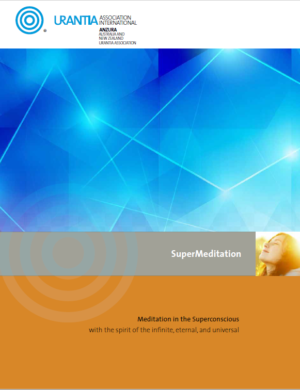Journal – May 2019
(Note: To print a hard copy of this Journal click the “Print Version” button above. After the print version appears, right-click into any white space and choose “Print.”)
|
In This Issue
|
|
Suzanne Kelly, USA Greetings Fellow Urantia Book Readers,
 The first production of the Journal for 2019 highlights authors from around the world and their in-depth presentations of those portions of the book that spoke to them personally. In sharing their experiences, we hope you will discover a greater understanding as well. The first production of the Journal for 2019 highlights authors from around the world and their in-depth presentations of those portions of the book that spoke to them personally. In sharing their experiences, we hope you will discover a greater understanding as well.
Our first essay by Jeanne Vasquez from Uruguay, The Function of Prayer to Strengthen our Faith, was presented at the 2nd Latin-American Conference, São Paulo, Brazil, on November 2018. To clarify her understanding of faith and the function of prayer in making her faith stronger, she first examines this quote:
Belief has attained the level of faith when it motivates life and shapes the mode of living. The acceptance of a teaching as true is not faith; that is mere belief. Neither is certainty nor conviction faith. A state of mind attains to faith levels only when it actually dominates the mode of living. Faith is a living attribute of genuine personal religious experience. One believes truth, admires beauty, and reverences goodness, but does not worship them; such an attitude of saving faith is centered on God alone, who is all of these personified and infinitely more. [Paper 101:2.1, page 1114:5]
Jeanne personally surmises that “…a belief in divine teaching, even a belief in The Urantia Book, unless it gradually becomes a living reality in ourselves, is not faith.” She expands this understanding beyond belief itself by actually applying it to her personal experiences through her living faith, which allows her to know God. She says, “This living and growing faith is a gift from God that dominates our mode of living effectively when we follow the divine guidance and teaching. Therefore, our choices and actions of moral and spiritual value are an essential part of the dynamic process of faith strengthening.” By examining the “characteristics of enlightened and effective prayer taught in The Urantia Book,” she edifies the worship experience and faithfully conveys to the reader, “The spiritualization of our minds and souls springs from the personal spiritual experience with God within ourselves, growing through the worshipful communion with God to the loving and altruistic service to humanity, fulfilling the supreme duty of every human being by increasingly yielding the fruits of the spirit in our lives.”
The second contributor, Mark Blackham from Canada, affords us with a spiritual road map in Worship: a Son’s Experience. From his own experiences Mark “…discovered that many spiritual seekers, including many readers of The Urantia Book, have difficulty engaging in sincere worship… It took me a long time to overcome this stumbling block, and I was able to do so only through some deep reflection, timid prayer, and the kind assistance of others.” By examining his personal family interactions, he began to understand that “The conscious recognition of my unresolved issues, my father’s life, and my dawning forgiveness brought about significant changes in my viewpoint, and the subsequent healing experiences were profound.” He found comfort in Jesus’ words in the following passage from The Urantia Book:
“As time passes, fathers and their children will love each other more, and thus will be brought about a better understanding of the love of the Father in heaven for his children on earth.” [Paper 142:2.2, page 1597.2]
Mark’s worship experience road map stops along the way to encompass the vistas of worship and communion, getting to know God, checking attitudes, making choices, as well as many other panoramic considerations that round out the journey to a destination point he found in the benefits of worship, overcoming limitations to worship, and doing the Will of God, all of which lead us to Paradise.
If you yield to the leadings of the spiritual forces in you and around you, you cannot fail… [Paper 5:1.12, page 64.3]
The final essay on The Meaning of Worship and Service comes from William Wentworth of Australia, and originally presented at the Australian National Conference, October 2010. In his search for the meaning of worship and service, he understands that worship is a personal experience and is a way to honor God as our Father but he also asks, “Is it also the recognition of the non-personal aspect of deity?” Believing that it is, he refers to Jesus’ teaching, defining worship as:
…the act of a part identifying itself with the Whole; the finite with the Infinite; the son with the Father; time in the act of striking step with eternity. Worship is the act of the son’s personal communion with the divine Father, the assumption of refreshing, creative, fraternal and romantic attitudes by the human soul-spirit. [Paper 143:7.8, page 1616:10]
William also helps us understand the difference between prayer and worship: “Prayer is asking the Father for something, a request for the exercise of divine power to assist the son in solving some problem. There is self-interest involved. Worship, on the other hand, asks for nothing. It is purely an attempt to commune with the Father…”
In defining worship and prayer, he outlines the benefits of both and how they strengthen the meaning of service as tied to love, reiterating that “love is the desire to do good to others; service is the attempt to actually do that good.” Worship is the result of that understanding and its recognition of our sonship with our Father God.
And last but not least you will find an introduction to SuperMeditation—Meditation in the Superconscious, which is a comprehensive topical study aid presented in a series of modules produced by Neil Francey of Australia. If you ever wanted to do an in-depth study on worship as taught in The Urantia Book, then this study aid is for you. As Neil says, “This approach to meditation seeks the highest ideals, divine goals, and worthy insights. It is free from the constraints of authoritative religions, mysticism, rituals, and habitual formulas. It is multifaceted: thoughtful problem solving, making contact with our indwelling spirit, engaging in worship, becoming service orientated; all separate yearnings and yet they all interrelate.”
Happy and enlightened reading.
|
|
Jeannie Vazquez, Uruguay (Adapted from a presentation given at the 2nd Latin-American Conference, São Paulo, Brazil, on November 2018)
 To start the analysis of this subject and to understand more clearly the function of prayer in the strengthening of our faith by making it experiential, living, and growing faith, let’s start by seeing what faith actually is. To start the analysis of this subject and to understand more clearly the function of prayer in the strengthening of our faith by making it experiential, living, and growing faith, let’s start by seeing what faith actually is.
Belief has attained the level of faith when it motivates life and shapes the mode of living. The acceptance of a teaching as true is not faith; that is mere belief. Neither is certainty nor conviction faith. A state of mind attains to faith levels only when it actually dominates the mode of living. Faith is a living attribute of genuine personal religious experience. One believes truth, admires beauty, and reverences goodness, but does not worship them; such an attitude of saving faith is centered on God alone, who is all of these personified and infinitely more. [Paper 101:8.1, page 1114.5]
According to this quote, a belief in divine teaching, even a belief in The Urantia Book, unless it gradually becomes a living reality in ourselves, is not faith. Faith is a living attribute of genuine personal religious experience [101:8.1, 1114.5], and this experience has its origin in the spiritual presences that guide us.
Let us consider how we can progress from a mere intellectual belief in God and the divine teaching delivered to us by his Sons, to the application of these teachings in our lives. In my view, to attain such progress, it is essential to make a sincere consecration to seek divine realities and spiritual and eternal objectives. This consecration enables us to make the decisions and carry out the actions that realize our eternal destiny. The revelator in The Urantia Book says:
Convictions about God may be arrived at through wise reasoning, but the individual becomes God-knowing only by faith, through personal experience. In much that pertains to life, probability must be reckoned with, but when contacting with cosmic reality, certainty may be experienced when such meanings and values are approached by living faith. [Paper 102:6.5, page 1124.7]
What is the personal experience that allows us to know God? We know God through living faith which grows through our personal experience with him. Knowing God nourishes and strengthens our faith, which is part of the divine and transforming gift that constitutes the reality of our God-consciousness. The question that arises now is: How can we carry out this experience in our lives? Let’s look at what The Urantia Book says about personal experience:
When man decides, and when he consummates this decision in action, man experiences, and the meanings and the values of this experience are forever a part of his eternal character on all levels, from the finite to the final. Cosmically moral and divinely spiritual character represents the creature’s capital accumulation of personal decisions which have been illuminated by sincere worship, glorified by intelligent love, and consummated in brotherly service. [Paper 117:5.13, page 1287.4]
The decisions that have been illuminated by sincere worship, glorified by intelligent love, and consummated in brotherly service are of high moral value because they are steadfast, persistent and sincere. Their purpose is to do the will of God—doing the highest possible good, and are based on a reasoned knowledge of truth, augmented by wisdom and sanctioned by our religious faith. These are the decisions and actions that have survival meaning and value and which will be a part of our eternal character because they are motivated by the saving faith of those who love and worship God, who love and serve their siblings unselfishly. Said Jesus:
“…Even this saving faith you have not of yourselves; it also is the gift of God. And if you are the children of this living faith, you are no longer the bondslaves of self but rather the triumphant masters of yourselves, the liberated sons of God.” [Paper 143:2.7, page 1610.2]
“…This survival faith is a living faith, and it increasingly manifests the fruits of that divine spirit which first inspired it in the human heart. That you have once accepted sonship in the heavenly kingdom will not save you in the face of the knowing and persistent rejection of those truths which have to do with the progressive spiritual fruit-bearing of the sons of God in the flesh.” [Paper 176:3.3, page 1916.3]
 This living and growing faith is a gift from God that dominates our mode of living effectively when we follow the divine guidance and teaching. Therefore, our choices and actions of moral and spiritual value are an essential part of the dynamic process of faith strengthening. Our active involvement in this process is important. Jesus and the revelators’ teachings show us that this living and experiential path consists essentially in our wholehearted consecration to the doing of the will of God. A Melchizedek in Paper 102 states: This living and growing faith is a gift from God that dominates our mode of living effectively when we follow the divine guidance and teaching. Therefore, our choices and actions of moral and spiritual value are an essential part of the dynamic process of faith strengthening. Our active involvement in this process is important. Jesus and the revelators’ teachings show us that this living and experiential path consists essentially in our wholehearted consecration to the doing of the will of God. A Melchizedek in Paper 102 states:
…There must be perfection hunger in man’s heart to insure capacity for comprehending the faith paths to supreme attainment. If any man chooses to do the divine will, he shall know the way of truth. [Paper 102:1.1, page 1118.4]
When we wholeheartedly choose to live by doing the divine will—that is the supreme decision—the Spirit of Truth enters into our mind and soul and then the living sap of the living vine, which is Jesus, flows through us. Then we are reborn of the spirit and become divinely God-conscious as he gives us this new consciousness of spiritual strength with a new and profound sense of spiritual joy, security, and confidence. To experience the happiness of receiving the Spirit of Truth consciously in the soul “…is a tonic for health, a stimulus for mind, and an unfailing energy for the soul.” [194:3.19, 2065.7]
The spiritual growth achieved through the divine values of the religious experience is the fruit of divine love, received by our living faith, with trust and wholehearted devotion to our Heavenly Father. These divine fruits and values are the key to our growth and eternal survival. By living this spiritual experience, we are becoming superhuman; our soul is moving forward along the path of the eternal progress. Jesus said:
“In order to yield the fruits of the spirit, you must be born of the spirit.” [Paper 156:5.2, page 1738.1]
In fact, the branch exists only for, and can do nothing except, fruit bearing, yielding grapes. So does the true believer exist only for the purpose of bearing the fruits of the spirit: to love man as he himself has been loved by God—that we should love one another, even as Jesus has loved us. A true believer is someone who lives the divine teachings. The fruits of the spirit manifest as divine love in ourselves; these fruits are God’s gifts.
Machiventa Melchizedek taught that favor with God is to be had by faith; that God agrees to do everything; man only agrees to believe God’s promises and follow his instructions. We need the living experience of knowing God within ourselves to nourish and vivify our faith, growing up, by grace, to the full stature of spiritual adulthood. Jesus said:
“If, then, my children, you are born of the spirit, you are forever delivered from the self-conscious bondage of a life of self-denial and watchcare over the desires of the flesh, and you are translated into the joyous kingdom of the spirit, whence you spontaneously show forth the fruits of the spirit in your daily lives; and the fruits of the spirit are the essence of the highest type of enjoyable and ennobling self-control, even the heights of terrestrial mortal attainment—true self-mastery.” [Paper 143:2.8, page 1610.3]
If we consider the fact that faith is a gift of God, a living attribute of genuine personal religious experience, and this faith consists in living the will of God effectively by sharing with him our inner life, we can discern this process as a feedback loop. In other words, the growing and living faith is a gift of God in response to our sincere quest for God and his truth. At first, our faith is small like a candle flame, but as we follow the divine guidance, live the teachings, and do the will of God increasingly, the Father works within us, giving us more of his guidance, his gifts, and his love, strengthening and nourishing our faith and making it grow. And this living faith, in turn, acts to release the superhuman activities of the divine spark [132:3.6, 1459.6].
…But living religious faith is more than the association of noble beliefs; it is more than an exalted system of philosophy; it is a living experience concerned with spiritual meanings, divine ideals, and supreme values; it is God-knowing and man-serving. [Paper 101:8.2, page 1114.6, emphasis added]
The revelation informs us that those who know God have experienced the fact of his presence through a personal experience in which our minds and souls make spiritual contact with the presence of God, who resides within us.
But you cannot be sure about God unless you know him; sonship is the only experience which makes fatherhood certain. [Paper 102:7.1, page 1126.1]
The big question is: How can we experience the divine presence of God and come to know him?
If “God who is spirit can be known only as a spiritual experience,” [169:4.13, 1857.4] what can we do to live this spiritual experience in the highest and most ideal way? Here we have some teachings that will help us to find the answer:
But real praying does attain reality. Even when the air currents are ascending, no bird can soar except by outstretched wings. Prayer elevates man because it is a technique of progressing by the utilization of the ascending spiritual currents of the universe. [Paper 91:8.9, page 1002.1]
Genuine prayer adds to spiritual growth, modifies attitudes, and yields that satisfaction which comes from communion with divinity. It is a spontaneous outburst of God-consciousness. [Paper 91:8.10, page 1002.2]
But there is also a domain of prayer wherein the intellectually alert and spiritually progressing individual attains more or less contact with the superconscious levels of the human mind, the domain of the indwelling Thought Adjuster. [Paper 91:2.6, page 996.4]
Prayer then, is a necessary activity to experience the presence of God and to know him. This living experience nourishes our faith through communion with him in our superconsciousness. Prayer, as The Urantia Book teaches us, has an increasingly spiritualizing and ennobling effect in ourselves when it is accompanied by worship, which is the receptive phase that feeds our soul, in an ideal way, with the divine gifts.
Words are irrelevant to prayer; they are merely the intellectual channel in which the river of spiritual supplication may chance to flow. …God answers the soul’s attitude, not the words. [Paper 91:8.12, page 1002.4]
The characteristics of enlightened and effective prayer taught in The Urantia Book are:
Believing—we must recognize the presence of God in Paradise and within ourselves.
Ethical, altruistic—we must not seek selfish advantage over our fellows.
Trustful—in submission to the Father’s all-wise will.
Sincere—the sincerity of our prayer is the assurance of its being heard; the spiritual wisdom and universe consistency of any petition determines the time, manner, and degree of the answer.
With faith—in our prayers, let us ask for strength and guidance to act, to augment the technique of living.
Intelligence—in the light of scientific facts, philosophic wisdom, intellectual sincerity, and spiritual faith.
Persistence—Jesus said:
“Prayer is the breath of the soul and should lead you to be persistent in your attempt to ascertain the Father’s will.” [Paper 144:2.3, page 1619.1]
Let’s pray when harassed, but also speak to our Father even when all goes well with our soul.
Let’s give thanks to the Father for all his blessings. This kind of prayer leads up to the communion of true worship.
Jesus taught that prayers for divine guidance over the pathway of earthly life was next in importance to the petition for a knowledge of the Father’s will. In reality, this means a prayer for divine wisdom.
 Jesus taught that prayer is a factor in the enlargement of our capacity to receive the presence of the divine spirit. Jesus taught that prayer is a factor in the enlargement of our capacity to receive the presence of the divine spirit.
When Jesus taught us to pray in the spirit and in truth, he explained that he referred to praying sincerely and in accordance with our enlightenment, to praying wholeheartedly and intelligently, earnestly, and steadfastly.
At the end of our prayer (be it personal or group prayer), let’s remain for a time in silent receptivity to afford the indwelling spirit the better opportunity to speak to our listening soul. The spirit of the Father speaks best to us when our mind is in an attitude of true worship.
… Prayer will lead the mortals of earth up to the communion of true worship. The soul’s spiritual capacity for receptivity determines the quantity of heavenly blessings which can be personally appropriated and consciously realized as an answer to prayer. [Paper 144:4.4, page 1621.3]
Worship, taught Jesus, makes one increasingly like the being who is worshiped. Worship is a transforming experience whereby the finite gradually approaches and ultimately attains the presence of the Infinite. [Paper 146:2.17, page 1641.1]
When we pray in this way, we recharge the spiritual batteries of the soul, and in worship, we tune in the soul to catch the universe broadcasts of the infinite spirit of the Universal Father. Worship is an attitude of saving faith that affords us spiritual growth and greater personality integration.
Worship is a personal communion with that which is divinely real, with that which is the very source of reality. Man aspires by worship to be better and thereby eventually attains the best. [Paper 196:3.22, page 2095.6]
Our realization of the reality of the worship experience depends on the developmental status of our born-of-the-spirit immortal soul. This spiritual capacity of the soul grows as we commune internally with the Father in prayer and worship—in a constant feedback loop.
…the experience of God has no limits save those of the creature’s comprehension capacity, and this very experience is in itself capacity enlarging. [Paper 117:6.9, page 1289.2]
… the better approach to the morontia zones of possible contact with the Thought Adjuster would be through living faith and sincere worship, wholehearted and unselfish prayer. [Paper 100:5.7, page 1099.5]
In true worship we ask nothing and expect to receive nothing, but this does not mean that we do not receive anything, because if we consider that true worship make us increasingly like God, it is clear that in it we receive heavenly blessings—spiritual fruits, divine values, love, spiritual discernment, growth to our souls. We worship God for what we comprehend him to be, and this comprehension is implicit in our true worship. The depth of our worship is conditioned by our concept of God, and it determines our capacity to receive the divine gifts.
Why are prayer and worship so important?
… prayer is a function of spirit-born believers in the spirit-dominated kingdom. [Paper 180:2.7, page 1946.5]
The cry of the righteous is the faith act of the child of God which opens the door of the Father’s storehouse of goodness, truth, and mercy, and these good gifts have long been in waiting for the son’s approach and personal appropriation. Prayer does not change the divine attitude toward man, but it does change man’s attitude toward the changeless Father. The motive of the prayer gives it right of way to the divine ear, not the social, economic, or outward religious status of the one who prays. [Paper 146:2.8, page 1639.3]
The sincere prayer of faith opens the doors to God’s action within ourselves. It is a wholehearted communication with our Father, which nourishes and sustains our personal relationship with him. Our Master Jesus attained a high consciousness of the presence of God by intelligent prayer and sincere worship—unbroken communion with God. Jesus’ life is an example for all of us—when we live by his teachings, we can also attain a high consciousness of God.
…Such a God-knowing person is inwardly illuminated by worship and outwardly devoted to the wholehearted service of the universal brotherhood of all personalities, a service ministry which is filled with mercy and motivated by love, while all these life qualities are unified in the evolving personality on ever-ascending levels of cosmic wisdom, self-realization, God-finding, and Father worship. [Paper 106:9.12, page 1175.1]
The Father’s supreme mandate, the perfect expression of God’s will that summarizes the ascendant path, is: “Be you perfect, even as I am perfect.” To become perfect as the Father is, we need to find him first within ourselves and start making an effort to be like him by transforming and vivifying our souls—by receiving the bread of life, the living truth, the eternal word of God, as well as the water of life of the Spirit of Truth that nourishes the soul, quenching our spiritual thirst.
The imitation of God is the key to perfection; the doing of his will is the secret of survival and of perfection in survival. [Paper 111:5.2, page 1221.3]
The ascendant path begins here, in this life, when we start to follow the guidance of God, recognizing him as our Father—and when we keep growing in faith and the love of God until we are reborn of the spirit by our living faith, all with the full confidence of a little child who trusts in the love of his earthly parent. In this way, we will achieve perfection gradually, and every step that we take in doing God’s will, is a partial fulfillment of the supreme mandate. Prayer and worship are vital to maintain the connection with God and nourish our soul, yielding abundant fruits of the spirit.
Prayer is indeed a part of religious experience, but it has been wrongly emphasized by modern religions, much to the neglect of the more essential communion of worship. The reflective powers of the mind are deepened and broadened by worship. Prayer may enrich the life, but worship illuminates destiny. [Paper 102:4.5, page 1123.5]
The Urantia Book teaches us that true worship requires the use of the following techniques:
Silent receptivity to afford the indwelling spirit the better opportunity to speak to the listening soul. Therefore, in worship we do not praise God, talk mentally, or repeat or focus our attention on any phrase, thought, or image. Praising, repetition of inspiring phrases, and expressing mental concepts about God, all these precede worship, they are not part of it.
Self-forgetting—superthinking: If we forget ourselves when we are focusing on the Father in silent and receptive attention, we transcend thinking, attaining worshipful contact in our superconsciousness. Says the revelator:
Religion must continually labor under a paradoxical necessity: the necessity of making effective use of thought while at the same time discounting the spiritual serviceableness of all thinking. [Paper 102:3.1, page 1121.3]
We make effective use of thought processes when we seek, study, analyze, comprehend, share, and live the truth, and when we pray sincerely. We discount all processes of thinking when we elevate ourselves to the superconscious level in the inner worshipful silence, transcending thinking with love and devotion to the Father. Let us remember that it is the soul who worships God with the consent of the mind. Worship is a superconscious activity.
Effortless attention focused on God’s presence, which indwells our superconsciousness. Worship is effortless attention, true and ideal soul rest, a form of restful spiritual exertion. [Paper 143:7.7, page 1616.9]
To step aside from the rush of life—to escape the harassments of material existence—while [believers] refresh the soul, inspire the mind, and renew the spirit by worshipful communion. All this is done by God; this is the function of silent spiritual receptiveness.
Restfulness, relaxation (physical and mental stillness). The strain of living—the time tension of personality—should be relaxed by the restfulness of worship. [Paper 143:7.3, page 1616.5]
… Relaxation determines the capacity for spiritual receptivity. [Paper 160:3.1, page 1777.2]
We ask nothing and expect to receive nothing. There is absolutely no self-request or any other element of personal interest in true worship—we simply worship God for what we comprehend him to be.
Our Father will give us the heavenly blessings that he knows we need. The quality of our worship is determined by the depth of our perception and our knowledge of the infinite character of God.
Our inner self must be intent upon God: He who is full of faith worships truly when his inner self is intent upon God. [131:4.5, 1448.4]
When should we pray and worship our Father? In a talk with the apostles, Jesus said:
“But when to pray, I will not say. Only the spirit that dwells within you may move you to the utterance of those petitions which are expressive of your inner relationship with the Father of spirits.” [Paper 146:2.11, page 1639.6]
Although Jesus didn’t establish daily prayer as a rule, he did teach we should pray sincerely, earnestly, and steadfastly.
He [Peter] admonished them to neglect not their daily worship. [Paper 163:4.10, page 1805.7]
Simon Peter said this during his ordination sermon when he preached to the seventy evangelists, which was an elaboration of the Master’s charge given at the time he laid his hands upon them and set them apart as messengers of the kingdom. On another occasion, Jesus said:
“Prayer and its associated worship is a technique of detachment from the daily routine of life, from the monotonous grind of material existence. It is an avenue of approach to spiritualized self-realization and individuality of intellectual and religious attainment.” [Paper 144:4.5, page 1621.4]
When we love God with a whole heart, we want to do his will above all things. To be in communion with him is something we yearn to do every day of our lives. Believing in Jesus and the revelators’ teachings means that we put them into practice, and then they become a living reality in us. For this, we need to choose to respond to the divine leading by sincerely basing our human life on the highest consciousness of truth, beauty, and goodness, and striving to coordinate these divine qualities in our lives through wisdom, worship, faith, and love. Then our faith will grow and become alive through our inner experience with God—by following the divine guidance and receiving the divine gifts in our minds and souls.
Of God, the most inescapable of all presences, the most real of all facts, the most living of all truths, the most loving of all friends, and the most divine of all values, we have the right to be the most certain of all universe experiences. [Paper 102:7.10, page 1127.4]
This is all made possible if we are willing to follow the right path taught in the revelation, opening the heart to divine love. We need to have the courage to make wise decisions, survival decisions. Sometimes we will need to get rid of a pet evil that inhibits the growth of our soul.
When we search for God, we are searching for everything. And when we find God, we have found everything. Our spiritual growth is proportional to Father identification; success in our quest of the Infinite is directly proportional to our achievement of Father-likeness. We appropriate these qualities of divinity personally through the experience of living divinely, and to live divinely means actually to live the will of God. This life is predicated on the living of the Father’s will, is inwardly illuminated by worship, and is devoted to the wholehearted service of all human beings through mercy and love. The spiritualization of our minds and souls springs from the personal spiritual experience with God within ourselves, growing through the worshipful communion with God to the loving and altruistic service to humanity, fulfilling the supreme duty of every human being by increasingly yielding the fruits of the spirit in our lives.
The Urantia Book contains divine truths that must become mightily alive within us by the action of the Spirit of Truth and the divine Adjuster, thus we have a growing spiritual vitality and an increasing spiritual power. Spiritual works can be done only by having spiritual power, which arises from the personal experience of possessing a living, experiential faith. The inner strength that enables us to transmit the certainty of the divine realities springs forth from our personal spiritual experiences with those realities.
|
|
Mark Blackham, Canada  The Life Experience The Life Experience
I write this account as a way of sharing my personal religious experience in the acquired art of worship. For me, the telling is somewhat therapeutic and, for others who may have encountered similar circumstances in their lives, I hope it can serve as a positive affirmation.
Worship is simply the feeling or expression of reverence and adoration for Deity. It is an extraordinary act of personal communion with the living presence of God. It is a way of tapping into a divinely creative power to bring about positive transformations of character, and it can provide remarkable spiritual insights. This is why The Urantia Book urges us to worship on a daily basis.
But over the years, I discovered that many spiritual seekers, including many readers of The Urantia Book, have difficulty engaging in sincere worship. This was certainly the case for me. It took me a long time to overcome this stumbling block, and I was able to do so only through some deep reflection, timid prayer, and the kind assistance of others. My ability to worship in a wholehearted manner was not something that came to me all at once, but rather bit by bit over an extended period.
I discovered the revelation at the age of twenty-three. From the moment I began to read it, I was convinced I had found the truth. At first, I was particularly drawn to the historical and scientific content, subjects that I readily absorbed. But, in retrospect, my understanding of the spiritual content was severely limited.
Despite my growing interest in this revelation, it did little to lift my spirits, cure my troubles, or make my life any easier over the following years. Even though I believed what I read, I was a very confused and emotional young man, much more confused than I could have possibly imagined at the time. Consequently, I continued to make poor decisions, and poor decisions led to more trouble and much heartache.
While I continued to find the material facts of the book intriguing, the spiritual messages failed to take hold, except on a rather superficial level. I thought I believed, I thought I had faith—but it was not genuine—I felt spiritually barren. For reasons unclear to me, I found it almost impossible to pray or worship sincerely. I simply could not conceive of a kind and loving Father in heaven, let alone bring myself to venerate him.
It took me many years to realize that my difficulties with worship stemmed primarily from my less-than-ideal relationship with my earth father, the serious implications of which I did not fully appreciate until later in life. Growing up, I lived in constant fear of my father and his fits of anger, yet I craved his love and attention. He was a cruel and selfish man, but he was also a loyal provider, intelligent, well educated, articulate, and at times, he could be quite humorous. He drank too much Canadian whiskey and smoked roll-your-owns. Around the house, it was like living with a British colonel, one who believed in the harsh adage “spare the rod and spoil the child.” The willow stick was his weapon of choice and he wielded it with gusto at the slightest misdemeanor, ruling with fear, intimidation, and ridicule.
My father never showed any affection toward me or my siblings—not once. And I can count on one hand the number of times we shared company in any outing. As I grew into my teens, I sheepishly resisted his cruel tactics, which only made matters worse. He had stopped using the stick by this time but continued to relish in verbal abuse. He was a man who would not tolerate differing opinions or any kind of dissent, and there was much dissention between us. We finally parted ways after a bitter argument. I was twenty years old at the time.
Sadly, my father and I had no chance to reconcile our differences because he died of cancer five years later at the age of fifty-two. Despite our sharp differences and personal estrangement, his death was one of the most painful experiences of my life. I was grief-stricken, angry, and confused. For decades, I literally could not speak of my father. Any words about him choked in my throat and brought inexplicable tears to my eyes.
This changed only when I reached my forties, almost twenty tumultuous years later. At the time, I was attending university and making an effort to overcome my fear of public speaking. Fortunately, the psychology department was looking for guinea pigs to test a new technique for the treatment of “social phobias,” of which a fear of public speaking was one. But the first thing they had me do, was to get cleared through a psychologist (to screen the unstable I presumed).
With great confidence in my own sanity, I stepped into the psychologist’s office to begin my first session. A pleasant and kindly woman greeted me, and I sat down with a smile to begin the interview. She started by asking a number of probing questions and, not more than fifteen minutes later, I was bawling like a baby. It was all about my father—the unspoken grief, the choking anguish, the unresolved issues, the unrequited love. For all those years, the pain had hung in my heart like a poisoned weight, inhibiting growth and blighting every relationship.
It took several visits to the psychologist’s office before I could talk about my father without gushing tears. But after a while, the pain eased, the weight lifted, and I began the slow healing process that comes with understanding and forgiveness. And as I looked more closely at my father’s life, the forgiveness came to me more easily.
My father was born in India in 1923 on a British tea plantation managed by his father. When he was just six years old, his younger sister died of malaria and his parents, fearful for the life of their only son, had him shipped off to a boarding school in Northern Ireland. In those days, British boarding schools were cold, stark, and demanding environments for a young boy. His parents visited him every five years and he had the occasional company of his aunts. With little emotional support from his family, he relied on his misled peers for guidance. And when he erred, as boys often do, he was beaten by prefects wielding cricket bats.
From boarding school, he attended college in North Wales where, ironically, he earned his senior matriculation in religion. After graduation, he joined the RAF and managed to survive 9,000 hours in the air. Following the war, he married my mother and they had three children before deciding to leave the rubble of England for a better life in Canada.
You begin to see that my father’s predicament was even worse than my own. He had virtually no parents at all. And through no fault of his own, he really had no concept about how to be a kind and loving father.
The conscious recognition of my unresolved issues, my father’s life, and my dawning forgiveness brought about significant changes in my viewpoint, and the subsequent healing experiences were profound. Not only was I feeling much better about myself, but I discovered a refreshing new interest in all things spiritual, which led me to take another look at the life and teachings of Jesus. As I studied and absorbed these papers again, I felt the beginning of a spiritual transformation. And when I came across the following passages, it was as though I was reading them for the first time.
As time passes, fathers and their children will love each other more, and thus will be brought about a better understanding of the love of the Father in heaven for his children on earth. [Paper 142:2.2, page 1597.2]
As long as we teach the child to pray, “Our Father who is in heaven,” a tremendous responsibility rests upon all earthly fathers so to live and order their homes that the word father becomes worthily enshrined in the minds and hearts of all growing children. [Paper 177:2.7, page 1923.1]
It was only through a study of Jesus’ life that I was able to dispel my deep-seated and tainted notions about fatherhood by replacing them with better concepts about what an ideal father should be. The more I came to know Jesus, the more I loved him, and this love eventually led to my conscious and final separation of the nature of my earth father from that of my heavenly Father. I came to replace an identity of fear with one of love, ridicule with respect, cruelty with compassion, and intimidation with consolation. I finally began to understand and accept in my heart the true nature of my divine Father and, with some excitement, I came to realize that he really does love me.
My parental experiences were not unusual. And it is a sad fact that many people have suffered throughout their adult lives as a result of the actions or words of unkind and unwise parents, even to the point of enduring terrible abuse. But all of us who have gone through such experiences need to make a concerted effort to rise above them if we wish to succeed. The process begins by clearly separating the undesirable qualities of our earth parents from the very desirable qualities of a beneficent God. It begins by knowing the true nature of God and thereby nurturing our faith in the infinite love, kindness, and goodness of a Divine Father. This process brings us to the realization that learning to love God is the beginning of worship.
The Worship Experience
I like clear definitions and useful techniques. Over time, praying to God seemed straightforward enough, although my prayers were perhaps a little selfish at first. Nonetheless, I understood that it was personally beneficial to pray for such things as courage, enlightenment, and spiritual receptivity. But when it came to worship, I remained uncomfortable. I needed to explore it further.
Worship is Communion
We often hear that worship is communion. But what is communion? The Urantia Book doesn’t use this term in the modern Christian sense, in reference to Christian unity, nor does it attach the ritual meaning of the Eucharist, or Holy Communion. Instead, the book uses the term in a common context which, in 1935, was defined by Webster’s as “fellowship, an intercourse between two persons.” The modern interpretation has changed little—it is “an act or instance of sharing” as defined in Webster’s 10th edition. It is even more helpful to look up some common synonyms for communion, which include such terms as: sharing, cooperation, communication, interaction, togetherness, agreement, and intimacy.
In other words, worship is sharing your life with God, communicating with God, cooperating with God, or interacting with God. It is a means of opening the spiritual channel through which God communicates with us, a channel that provides a continuous and beneficial stream of divine ministry. Worship literally opens a direct line to our Divine Creator, a real and vibrant spiritual connection.
Getting to Know God
Most of us understand worship as an act of veneration, adoration, and devotion, which it is. This seems simple enough, but what is it that we venerate and adore? Over the millennia, people have worshiped everything from phallic stones to Rolls-Royce gurus. But clearly The Urantia Book is not encouraging us to worship just for the sake of worship. Instead, the text is attempting to enlarge and expand our understanding and experience of the nature of God to the furthest limits of our creative imaginations. The revelators want us to know our Father to the fullest extent possible for a contemporary human mind.
Ezra, the tavern-keeper in Syracuse, told Jesus he could not find God. But Jesus said to him,
“Your trouble is not that you cannot find God, for the Father has already found you; your trouble is simply that you do not know God.” [Paper 130:8.2, page 1440.2]
To know God is to love him, and to love God is to know him. The more we come to know him, the more we truly desire to worship him; it becomes a natural and spontaneous reaction. We worship God for what we comprehend him to be, which is our highest concept of the personality and divinity of Deity. And this is one reason The Urantia Book dedicates the Foreword and the first five papers to an understanding of the nature, attributes, and relationships of God. But nowhere in the book is a knowledge of our Creator brought to such a human level of understanding as it is in the life and teachings of Jesus, our Father incarnate.
Check Your Attitude
Worship begins as a mental exercise—it is the conscious act of recognizing the truth and fact that we really do have a loving and personal relationship with our heavenly Father, a living spirit. Ultimately, the experience of worship transcends the mind, but the process begins with our thoughts. And worship comes much more easily to us if we are willing to accept the reality of our humble relationship with God.
The core of Jesus’ message is that God is our spiritual Father and, consequently, we are his sons and daughters. When we truly believe this, we come to realize that the reality of God is much, much more than his lowly creatures here on earth could ever imagine. To be able to climb the ladder of spiritual progress, we absolutely must be sincerely humble and completely trusting. Jesus took great pains to impress upon us that we must adopt an acceptable attitude of mind in order to feel the presence of God.
Not only is the divine nature best understood if we regard ourselves as children of God, but as Jesus said, the kingdom of heaven can best be realized by acquiring the spiritual attitude of a sincere child. By this, he meant acquiring a state of mind that believes without question and trusts completely. Trusting in the goodness of a heavenly Father is perhaps one of the most difficult steps for those of us who have experienced poor relationships with our parents, especially fathers.
Make a Choice
Worship is a choice, a powerful choice. The only power we really have is our free will—our freedom to choose. Neither God nor a Creator Son will interfere with our free will. It is sacrosanct. Consequently, if anything is going to happen we must consciously allow it to happen. Worship requires the free submission of our whole being to the embrace of God, thereby allowing our spiritualizing selves, our souls, to take control.
 Give Thanks Give Thanks
We ascend to true worship by being sincerely thankful. And one way to get our minds into this state of worship is by expressing prayers of gratitude. If you are unsure about what to be thankful for, I encourage you to ponder the seemingly magical presence of the Father’s Spirit within you, the Spirit of Truth beside you, and the Holy Spirit around you. All of these alluring spiritual forces work day and night in an attempt to re-create you as an eternal spirit being, as well as to reveal to you the amazing wonders of an almost limitless universe.
It is a good thing to give thanks to the Lord and to sing praises to the name of the Most High, to acknowledge his loving-kindness every morning and his faithfulness every night, for God has made me glad through his work. In everything I will give thanks according to the will of God. [Paper 146:2.15, page 1640.4]
Forget About Yourself
Forget yourself. Forget about what you did or what you said today, or what you should do and what you should say. Forget about the shopping list, forget about the bills. Focus your mind only on a loving God, by whatever name you choose to give him, and imagine as much as you can possibly imagine of his infinite love, his divine beauty, his eternal goodness, or any other divine quality you choose to venerate.
Submit to God knowing you have nothing to fear, knowing that only good things can come of it, knowing that he loves you as much as he loves any other being in the entire universe. Immerse your mind in the presence and love of a truly caring Divine Parent.
Find a Quiet Spot
Jesus spent days and weeks in communion with his Father. And when he did so, he always looked for a quiet place for his meditations, often in the beauty of nature. It’s very beneficial to worship in a place where you feel less likely to be disturbed in your contemplation. If you live in a busy household, try the bathtub!
Give It a Try
Nothing ventured, nothing gained. We are continually reminded, in the very least, to make an attempt to commune with God. When you worship, don’t expect the angels of heaven to visit you. Just keep in mind that God knows everything you do and have faith that, in time, all attempted communion will eventually result in the very real experience of feeling the divine presence of the Spirit Within.
Man does not have to go farther than his own inner experience of the soul’s contemplation of this spiritual-reality presence to find God and attempt communion with him. [Paper 5:0.1, page 62.1]
Give it Time
We live in a time-space universe in which all events are limited by time. Patience, therefore, is a critical virtue in all our endeavors. When Simon Zelotes was first accepted as an apostle, his greatest weakness was his material-mindedness, and we are told that even four years in Jesus’ company was not enough time for him to make the intellectual and emotional transformation to being spiritually minded [Paper 139:11.4, page 1565.1]. Nonetheless, by faith and perseverance, he eventually succeeded.
The Benefits of Worship
Ideally, worship is a state of self-forgetfulness in which we are not motivated by anything we derive from it. But even this can be a bit of a paradox because, while worship supposedly asks for nothing in return, it actually delivers much.
Worship relaxes us. It helps us to overcome feelings of anxiety or stress and it helps to remove mental conflicts that may result in depression or confusion.
The relaxation of worship, or spiritual communion as practiced by the Master, relieves tension, removes conflicts, and mightily augments the total resources of the personality. [Paper 160:1.12, page 1774.4]
Worship sharpens the power of mind and reveals destinies. As such, we are better able to evaluate our thoughts and behaviors from a progressive spiritual viewpoint, as well as to envision a future life in the spirit.
The reflective powers of the mind are deepened and broadened by worship. Prayer may enrich the life, but worship illuminates destiny. [Paper 102:4.5, page 1123.5]
Worship is creative. It will re-create you, it will transform you, as Jesus promised it would. Incessant naval gazing or self-evaluation is not the answer. Instead, try worshiping a loving, beautiful, and good Divine Being as a powerful way to overcome personal deficiencies.
Worship, taught Jesus, makes one increasingly like the being who is worshiped. Worship is a transforming experience… [Paper 146:2.17, page 1641.1]
Overcoming Limitations to Worship
Worship and spiritual progress are limited only by our capacity for spiritual receptivity and the capacity to love God in return. So how can we increase our capacity for spiritual receptivity? We are told it all starts with the temple of the Spirit: body and mind.
Clean up Your Temple
All physical poisons greatly retard the efforts of the Adjuster to exalt the material mind, while the mental poisons of fear, anger, envy, jealousy, suspicion, and intolerance likewise tremendously interfere with the spiritual progress of the evolving soul. [Paper 110:1.5, page 1204.3]
Rid yourself of physical poisons. From personal experience, I realized it was almost impossible to commune with God when I was intoxicated in any way. One of the most insidious concepts kept alive in the modern era is that either alcohol or drugs can induce a spiritual state of mind. In truth, these substances block our spiritual channels and close our path to God. We must make a choice to follow God’s will, remembering that Jesus warned us not to presume on our Father’s love. God is not a foolishly indulgent parent ever ready to condone sin and forgive recklessness. [Paper 147:5.9, page 1653.3].
And avoid mental poisons. In today’s world of rampant social media, it’s easy to become highly opinionated, to hold grudges, to envy friends who have bigger houses or fancy cars, or to fear the future. But none of this is our Father’s will. Avoid these inhibiting mental states, especially when attempting to worship. Dissolve them in love, mercy, truth, beauty, and goodness and wash your mind clean.
Love God
Jesus said the greatest commandment of all is to
“…love the Lord your God with all your heart and with all your soul, with all your mind and with all your strength.” [Paper 174:4.2, page 1901.2]
The love of God leads to intelligent and wholehearted worship. God’s love for us never diminishes; it is an infinite love much greater than we can possibly imagine. We are limited in our ability to worship only by our individual capacity to love God in return. Once again, we can improve our capacity to love our Maker simply by learning more about his divine nature.
Life’s Choices
The reality of our worship experience has much to do with our spiritual status, which seems like another paradox because we cannot progress in worship until we progress in spiritual growth and vice-versa. But the problem can be addressed through the exercise of choice, not just choosing to worship, but in every choice we make. Our souls, our spiritual selves, evolve as a consequence of our life choices, especially high moral choices made under stress. It shows our determination to do the will of God under any circumstances.
Our Father’s will is not entirely a mystery. At times, moral choosing is relatively easy. Most of us are aware that such acts as lying, stealing, cheating, envy, or avarice are morally wrong choices. But at other times, knowing which choices to make is not always so straightforward. We can, however, always guide and gauge our thoughts, actions, and speech by their content of truth, beauty, and goodness, as well as by our expressions of love and compassion for others. And we should never dismiss the power of prayer and worship when looking for solutions.
Let God Do It
One very effective way to overcome our limitations to worship and make spiritual progress is to have unwavering faith and absolute trust in the work of the Father’s Spirit. Whenever we are challenged by our limitations, always declare:
Even if I cannot do this, there lives in me one who can and will do it… [Paper 4:4.9, page 59.5]
This is a compelling statement. It brings to mind the philosophy of Alcoholics Anonymous where the initial concept is to openly admit that you can’t do it by yourself—you must first give yourself and your problems over to a higher power. Trusting in the power and love of God to transform us is a rejuvenating experience that eases many of life’s burdens.
Do His Will
We are told time and again to do our Father’s will. But doing his will is not a slavish commitment to a set of rules, nor is it a drudging duty. If you feel God’s will is something you must force yourself to do, you have missed the point. It is, rather, something you really want to do, and it is the greatest and most exciting challenge of your life. You will delve into it happily and wholeheartedly, wanting to give it your utmost effort. Doing God’s will becomes a joyful obsession when we come to realize there is absolutely nothing more rewarding in life than an adventure with God. There really is no other path worth following.
Living your life as God wants you to live does not mean you are sacrificing your individuality. Jesus celebrated the uniqueness and individuality of everyone, and he loved them all. Each of us has a unique and special contribution to the evolution of the universe. Let God show you what you can do.
You Cannot Fail
The whole scheme of spiritual progression is interrelated. Our moral choices affect our worship and our worship affects our moral choices. The entire religious experience of the individual is one of correct choosing guided by prayer and worship—communion with our Creator.
However, God’s ability to help us is greatly retarded by our own preconceived opinions and long-standing prejudices. This was certainly true for me when it came to worship. But I was able to overcome my inhibitions by first becoming consciously aware of my deep-seated prejudices toward my earth father, and then by asking my heavenly Father to help me see the truth. To all who stumble: have faith, he will help you too.
If you yield to the leadings of the spiritual forces in you and around you, you cannot fail… [Paper 5:1.12, page 64.3]
|
|
William Wentworth, Australia (Presented at the Hobart Anzura Conference, October 2010)
 The Meaning of Worship The Meaning of Worship
The urge to worship appears naturally with the activation of the sixth adjutant mind-spirit. In humans, the urge to worship and the capacity for it are innate. Although we all experience this urge as individuals and in our own way, in its most basic form, worship is the recognition and honoring of the mysterious and incomprehensible cause and motivator of everything.
Worship has evolved through many phases—animal worship, nature worship, polytheism, pantheism and so on—until in monotheism we come to recognize God as both the cause and source of everything and, as revealed to us most recently by Jesus, as a benevolent personality who loves us and has a place for each of us.
Worship is recognizing and honoring God as a father, but is it also the recognition of the non-personal aspect of deity? I think it is. Jesus defines worship as:
“…the act of a part identifying itself with the Whole; the finite with the Infinite; the son with the Father; time in the act of striking step with eternity. Worship is the act of the son’s personal communion with the divine father, the assumption of refreshing, creative, fraternal and romantic attitudes by the human soul- spirit.” [Paper 143:7.8, page 1616.11].
For Jesus, worship consists of both personal communion with the Father and recognition of the Infinite as the source of everything. It is worth bearing in mind that this second aspect of worship is suggested by Jesus, and that our attempts at personal communion with the Father are also bound up with our recognition of the source of reality and the divine plan of progression. In a sense, we worship God because we know something about him—about who he is and what he is doing.
Worship, then, is our attempt at communion with the Father, attempting to express ourselves to the Father, and is thus a very personal thing. The Father interacts with each one of us as individual personalities, and the form our communion takes depends on who is doing it and on the character of his relationship with the Father.
Worship and Prayer
Worship is often contrasted with prayer. Prayer is also an attempt by the son to communicate with the Father but differs from worship because it is a request for help. Prayer is asking the Father for something, a request for the exercise of divine power to assist the son in solving some problem. There is self-interest involved. Worship, on the other hand, asks for nothing. It is purely an attempt to commune with the Father and express the devotion of the son to the Father and loyalty to his purposes. There may be overtones of gratitude, of devotion, of adoration, of admiration, of co-operation—of many possible attitudes, depending on the personal attitude of the worshiper—but the flavor of loving communion permeates the interaction between the son and the Father.
The Personal Nature of Worship
The revelators emphasize the personal nature of worship. A Divine Counselor points out that:
The Universal Father never imposes any form of arbitrary recognition, formal worship or slavish service upon the intelligent will creatures of the universes. [Paper 1:2.2, page 22.5].
Worship is a personal matter. It is up to us as to how we go about it.
A Continuum
As I see it, the revelators suggest that there is a sort of continuum in worship, from highly structured formal worship to relatively informal and spontaneous worship. On the one hand, a Divine Counselor tells us that:
Sincere worship connotes the mobilization of all the powers of the human personality under the dominance of the evolving soul and subject to the divine directionization of the associated Thought Adjuster. [Paper 5:3.7, page 66.3].
On the other hand, he says:
The affectionate dedication of the human will to the doing of the Father’s will is man’s choicest gift to God; in fact, such a consecration of creature will constitutes man’s only possible gift of true value to the Paradise Father. In God, man lives, moves, and has his being; there is nothing which man can give to God except this choosing to abide by the Father’s will, and such decisions, effected by the intelligent will creatures of the universes, constitute the reality of that true worship which is so satisfying to the love-dominated nature of the Creator Father. [Paper 1:1.2, page 22.5].
Here we have the two poles of the continuum of worship. On the one hand, the mobilization of all the powers of personality and, on the other, the doing of the Fathers will, which constitutes the reality of true worship.
| Mobilization of all powers of personality |
Attempting to do Father’s will |
| Intense, Emotional |
Reflective, Philosophical |
| Special Occasion |
Everyday Life |
| Planned |
Spontaneous |
The mobilization of all the powers of personality suggests an enormous concentration of effort, the kind of thing which is unlikely to occur spontaneously or without considerable premeditation. And indeed, the revelators point out that in our future careers we need to learn the technique of worship—to learn how to do it. Mobilizing all the powers of personality does not come naturally.
At the other pole, we have worship as a part of everyday life as we attempt to do the Father’s will.
I suggest that most of our worship efforts will fall along this continuum. There are times when we feel intense emotions of gratitude or adoration, and our worship experience tends towards the intense concentration of the entire personality. There are other times when we find ourselves reflecting on our attempts to do the Father’s will and our worship experience tends towards a more philosophical interaction with the Father at the other extreme of the continuum.
 The Benefit to Us The Benefit to Us
Although we undertake worship without any thought of gain or reward, the revelators make plain to us that we derive enormous benefit from worship. The spiritual growth resulting from worship is immeasurable. Our indwelling Adjuster is constantly urging us to help improve its communication with our mind and personality by sharing our inner life with God, and it is worship which gives our Adjuster its best opportunities.
Whatever the case, we work out our own way of worship. And we are informed that we can never be highly conscious of the significance of true worship [5:3.7, 66.3]. Our material minds are not capable of making it conscious to us. However, Jesus points out that:
The spirit of the Father speaks best to man when the human mind is in the attitude of true worship. [Paper 146:2.17, page 1641.1]
and also: “Worship….makes one increasingly like the being who is worshiped.”
The Meaning of Service
We can think of service as applied love. The Urantia Book defines love as the desire to do good to others; service is the attempt to actually do that good. When Jesus says to Ganid that a good way to make friends is to watch for the opportunity to do something for others which you are sure they want done [130:7.2, 1438.5], he was pointing to a practical approach to service.
The Circuit of Love
The great circuit of love is described as being from the Father, through sons to brothers, and hence to the Supreme. Service is the practical acting out of this circuit. We express our love for our fellows by doing things for them that they want done, and this action of brotherly love repercusses in the Supreme. And at this point, we can remind ourselves that Jesus called his apostles to love men—not just the souls of men [191:5.3, 2043.1]. Service is not just to be aimed at the religious improvement of our fellows, or in their proposed salvation—it is to assist them in whatever way may be required.
Service is Voluntary
A Divine Counselor points out that the Father imposes no slavish service upon his creatures [Paper 1:1.2, page 22.5]. Freewill personalities serve voluntarily, and they must choose their avenues of service themselves. We are not slaves, and we decide how to serve.
The revelators point out that, whereas seraphim and other spiritual personalities naturally take delight in service, animal-origin creatures don’t. We have to learn that it is better to give than to receive from personal experience. We have to discover by trial and error how satisfying it can be to lend someone a helping hand. The life of service which Jesus lived is a great inspiration to us; to find out for ourselves what satisfaction we can derive from serving our fellows.
Service Takes Many Forms
The situation is sometimes a bit more abstract than simply helping someone. Sometimes we serve others by doing things not just for particular individuals but because we believe that some actions are good for our community. This form of service may influence professions we choose to follow or causes we adopt, or some such action which we see as service.
Some of us proceed through life with a gentle pressure on our motivation produced by our desire to co-operate with our indwelling Adjuster and Michael’s plan for his universe, or Urantia perhaps, which urges us towards service of mankind and which does much to determine how we react to the events of everyday life.
 There is something exhilarating about realizing we are in Michael’s team, trying to co-operate with one another and our celestial administrators in advancing our people and our planet towards light and life. Even menial boring tasks and drudgery become easier if we remember what a wonderful operation we are all part of. If we hold this perspective in our minds as we go about our daily lives, we are motivated to try to serve as the opportunity arises. It really does seem to inspire us if we keep in mind just what we are involved in, and with whom we are associated. Then we remember that everybody has a part to play and everything we do can help or hinder Michael’s plan for our planet and the entire universe. The fact that others may not know this is of no consequence to our ability to serve them. There is something exhilarating about realizing we are in Michael’s team, trying to co-operate with one another and our celestial administrators in advancing our people and our planet towards light and life. Even menial boring tasks and drudgery become easier if we remember what a wonderful operation we are all part of. If we hold this perspective in our minds as we go about our daily lives, we are motivated to try to serve as the opportunity arises. It really does seem to inspire us if we keep in mind just what we are involved in, and with whom we are associated. Then we remember that everybody has a part to play and everything we do can help or hinder Michael’s plan for our planet and the entire universe. The fact that others may not know this is of no consequence to our ability to serve them.
There seem to be as many ways of service as there are personalities to offer that service. It is entirely personal. Opportunities for service abound, and the more opportunities we seize, the more likely are we to do good, and to experience the satisfaction of having done it. To some extent, service is not so much what we do as how we do it, the attitude we take towards doing what we do.
Sometimes We Get It Wrong
Of course, even when the motive is to serve, there are times when we get it wrong, and what we do may cause harm rather than good. We try to help where we can and fail when we must. Experience is the teacher here, and all we can do is learn, dust ourselves off and try again. This may be one aspect of “fattening on disappointment” which the revelators tell us is such a large part of our future careers. As we often say, it is character building! And maybe we should remind ourselves that wise service can sometimes require us to resist giving in to silly demands for help. Sometimes this requires more determination than giving in.
Jesus and the Innkeeper
Ultimately, service is the attempt to do good. I really like what Jesus said to the mistress of the Greek inn:
Minister your hospitality as one who entertains the children of the Most High. Elevate the drudgery of your daily toil to the high levels of a fine art through the increasing realization that you minister to God in the persons whom he indwells by his spirit which has descended to live within the hearts of men, thereby seeking to transform their minds and lead their souls to the knowledge of the Paradise Father of all these bestowed gifts of the divine spirit. [Paper 133:4.8, page 1475.1].
Finally, to put worship and service into relationship with one another, remember what Rodan had to say about how Jesus used meditative worship and spiritual communion to derive the spiritual power to perform great acts of service [160:1.10, 1774.2]. This is how we can all go about our lives—communing with the Father through our indwelling Adjusters and applying the fruits of such communion to the service of our fellow men.
|
|
Neil Francey, Australia  …Meditation in the Superconscious with the Spirit of the Infinite, Eternal, and Universal …Meditation in the Superconscious with the Spirit of the Infinite, Eternal, and Universal
This is a comprehensive work based on the Urantia Papers that explores meditation in its ultimate form: SuperMeditation. It is based on the highest revelatory truths of the modern age.
SuperMeditation links our day-to-day life with spirit influences. It is not a quick and easy method. It works in a natural way over time and seeks to balance all attributes, powers and components of our being. There is no set method or sequence for the study of these modules. They need to be studied and applied in practical life circumstances.
SuperMeditation is the connection of material reality and our spiritual nature through the thinking mechanism we call mind. By attempting this liaison we develop our ability to face the demands of living more effectively.
We can also come to know the realm of our superconsciousness where we engage in profound thinking and personal communion with our Creator. The result is the development of our spiritual awareness, capacity, and receptivity.
 This approach to meditation seeks the highest ideals, divine goals, and worthy insights. It is free from the constraints of authoritative religions, mysticism, rituals, and habitual formulas. This approach to meditation seeks the highest ideals, divine goals, and worthy insights. It is free from the constraints of authoritative religions, mysticism, rituals, and habitual formulas.
It is multifaceted: thoughtful problem solving, making contact with our indwelling spirit, engaging in worship, becoming service oriented; all separate yearnings and yet they all interrelate. This new style of spiritual communion does not require passively chanting a mantra, focusing on an object, or trying to empty the mind.
The supreme desire for truth, coupled with the highest values, ensures this practice of searching for God within us is the most natural, safest, and worthwhile endeavor.
Is it effective? Does it work? Is it the way to a better life? Discover for yourself. Live it. It is an exciting adventure that lasts a lifetime. It is your unique and personal journey.
For the entire course click here or on the images for the PDF
|
|

The Journal is produced twice yearly and contains essays, articles and study aids by readers and for readers of The Urantia Book. Any interpretations, opinions, conclusions, or artistic representations, whether stated or implied, are those of the authors and do not necessarily represent the views and opinions of Urantia Association International, the National or Affiliate Urantia Associations, or the editorial team of the Association's Journal.
You can view the entire collection of issues in the archives. All issues before 2017 are downloadable PDF format.
The Journal is currently published in English  , French , French  and Spanish and Spanish  . (There are some older issues that were published in Finnish . (There are some older issues that were published in Finnish  .) You can view the French and Spanish Journals by clicking on the language choices in the pull down menu at the top of the page. .) You can view the French and Spanish Journals by clicking on the language choices in the pull down menu at the top of the page.
Subscriptions
The Journal is available electronically free of charge for anyone with an email address. Join our mailing list to receive free electronic copies.
To receive hard copies, you may subscribe to the Journal at the annual rate of $15.00 USD via any of the following methods:
- To subscribe on line click here
- To subscribe by telephone call: +1-773-572-1180
- To subscribe by check or money order, please send in $U.S. dollars only and make payable to “Urantia Association International”. Mail to:
Urantia Association International
4000 W Montrose Avenue #606
Chicago, IL 60641
Journal Team
- Chief Editor: Richard Jernigan
- Editors: James Woodward, Mark Blackham
- French Newsletter: Alain Cyr and Lucas Perier
- Spanish Newsletter: Olga Lopez
- Communications Chair: Myra Hight
Journal team is currently seeking reports and submissions from all Urantia Book students.
Submission Policy
The Journal editorial team welcomes all article submissions for consideration for current or future issues. Any submissions not used in the current issue are kept on file for potential future use. Urantia Association International does not compensate any author through payment or in any other manner for such voluntary submissions. The Journal editorial team reserves the right to reject or edit materials as it deems necessary for publication and, if edited substantially, will notify the author for their approval.
Send correspondence or article submissions to the above Chicago address or email the Chief Editor, Richard Jernigan.
Images
All contributors — if you submit images, you must either have the rights to those images or they must be in the public domain. In all cases, please include the appropriate credits.
Journal includes images from Pixabay and Unsplash. Many thanks to these companies and their artists for the wonderful service they provide. Image credits are assigned when available.
Citation Guidelines
Please follow our citation guidelines when quoting from The Urantia Book. These guidelines were revised in April 2023, including different citation styles.
Block Quotes
Block quotes are displayed as a separate paragraph, which can be a complete paragraph from the book or any portion thereof. They do not require quotation marks. Block quotes use the citation format shown below, where the first set of numbers refers to paper, section, and paragraph, and the second set refers to the page and paragraph of the editions of The Urantia Book as published by Urantia Foundation. Please note the punctuation.
The Universal Father is the God of all creation, the First Source and Center of all things and beings. First think of God as a creator, then as a controller, and lastly as an infinite upholder. 1:0.1 (21.1)
If you wish to emphasize words that are not already emphasized in The Urantia Book, add “emphasis added” at the end of the page reference.
First think of God as a creator, then as a controller, and lastly as an infinite upholder. 1:0.1 (21.1) emphasis added
Run-in or In-line Quotes
Run-in quotes form an integral part of your own paragraph. Put these quotes within quotation marks (no italics). They require only a short form citation including paper, section, and paragraph. Notice that the citation is included as a part of the quote with the period (full stop) following the quote. For example:
The Urantia Book starts out with a positive assumption, "The Universal Father is the God of all creation” (1:0.1).
Any run-in quote exceeding four lines should be separated out as a block quote. And similar to block quotes, any emphasis added to a run-in quote requires adding "emphasis added" to the citation.
Paraphrasing
If you paraphrase a quote, or derive information from any paragraph, use the same run-in quotation style.
The Universal Father is portrayed in The Urantia Book as a creator, controller and upholder (1:0.1).
References to other works
If you use quotes from, or make references to, other works, please include a citation in order to avoid plagiarism.
In these cases, mention Author, Title, and Year, either in the text or immediately following a quote. Alternatively, include the citation as a numbered footnote.
Size of Submissions
Please limit the size of your submission to 4,000 words or less. We encourage you to use your own words as much as possible and to avoid overusing quotes from the book. Direct quotations are more effective if they are used sparingly and for emphasis.
We always welcome articles about personal spiritual experiences as well as those with fresh insights and new perspectives. Also of interest are thematic studies and articles that compare, evaluate, or integrate academic research (scientific, social, religious, or otherwise) with the teachings of The Urantia Book.
|
|

 The first production of the Journal for 2019 highlights authors from around the world and their in-depth presentations of those portions of the book that spoke to them personally. In sharing their experiences, we hope you will discover a greater understanding as well.
The first production of the Journal for 2019 highlights authors from around the world and their in-depth presentations of those portions of the book that spoke to them personally. In sharing their experiences, we hope you will discover a greater understanding as well. To start the analysis of this subject and to understand more clearly the function of prayer in the strengthening of our faith by making it experiential, living, and growing faith, let’s start by seeing what faith actually is.
To start the analysis of this subject and to understand more clearly the function of prayer in the strengthening of our faith by making it experiential, living, and growing faith, let’s start by seeing what faith actually is. This living and growing faith is a gift from God that dominates our mode of living effectively when we follow the divine guidance and teaching. Therefore, our choices and actions of moral and spiritual value are an essential part of the dynamic process of faith strengthening. Our active involvement in this process is important. Jesus and the revelators’ teachings show us that this living and experiential path consists essentially in our wholehearted consecration to the doing of the will of God. A Melchizedek in Paper 102 states:
This living and growing faith is a gift from God that dominates our mode of living effectively when we follow the divine guidance and teaching. Therefore, our choices and actions of moral and spiritual value are an essential part of the dynamic process of faith strengthening. Our active involvement in this process is important. Jesus and the revelators’ teachings show us that this living and experiential path consists essentially in our wholehearted consecration to the doing of the will of God. A Melchizedek in Paper 102 states: Jesus taught that prayer is a factor in the enlargement of our capacity to receive the presence of the divine spirit.
Jesus taught that prayer is a factor in the enlargement of our capacity to receive the presence of the divine spirit. The Life Experience
The Life Experience Give Thanks
Give Thanks
 The Meaning of Worship
The Meaning of Worship The Benefit to Us
The Benefit to Us There is something exhilarating about realizing we are in Michael’s team, trying to co-operate with one another and our celestial administrators in advancing our people and our planet towards light and life. Even menial boring tasks and drudgery become easier if we remember what a wonderful operation we are all part of. If we hold this perspective in our minds as we go about our daily lives, we are motivated to try to serve as the opportunity arises. It really does seem to inspire us if we keep in mind just what we are involved in, and with whom we are associated. Then we remember that everybody has a part to play and everything we do can help or hinder Michael’s plan for our planet and the entire universe. The fact that others may not know this is of no consequence to our ability to serve them.
There is something exhilarating about realizing we are in Michael’s team, trying to co-operate with one another and our celestial administrators in advancing our people and our planet towards light and life. Even menial boring tasks and drudgery become easier if we remember what a wonderful operation we are all part of. If we hold this perspective in our minds as we go about our daily lives, we are motivated to try to serve as the opportunity arises. It really does seem to inspire us if we keep in mind just what we are involved in, and with whom we are associated. Then we remember that everybody has a part to play and everything we do can help or hinder Michael’s plan for our planet and the entire universe. The fact that others may not know this is of no consequence to our ability to serve them.

